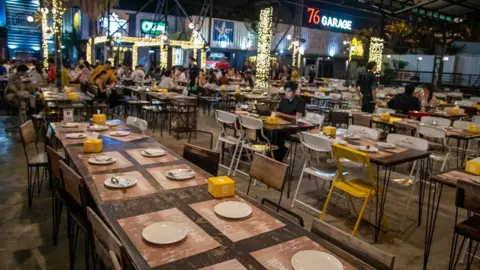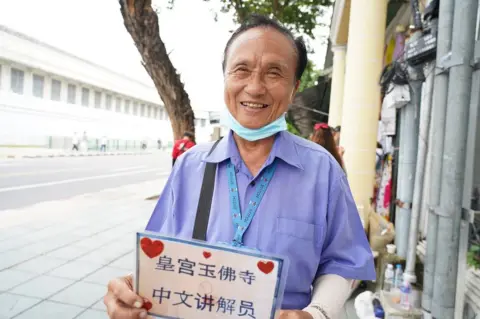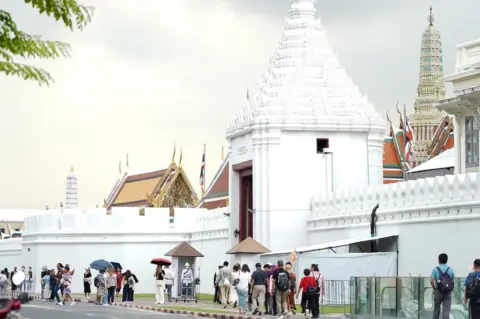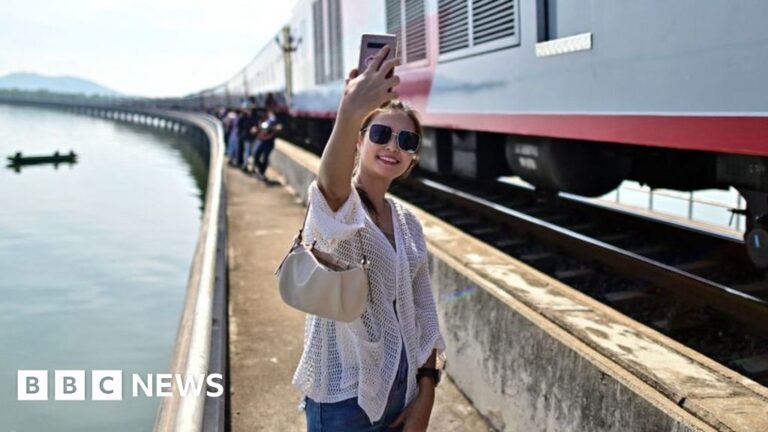November 7, 2023
Jonathan Head, Bangkok
 BBC
BBC
The highlight of 76 Garage, a restaurant popular with Chinese tourists, is the photo opportunity at the pool with the male servers.
For Chinese tourists visiting Bangkok, 76 Garage, an open-air restaurant in the Thai capital’s northern suburbs, has long been high on the list of destinations.
And they don’t go there for the food, but for the waiters.
There is a swimming pool in the middle of the restaurant, and the highlight of the evening is when the young, fit, male waiters all strip down to shorts, jump in the pool, and carry customers in for photos and tips.
76 Garage was once so popular you had to book a month in advance to get a table – now half the tables are empty.
Thailand’s highly regarded tourism industry is losing its biggest customers: the Chinese.
When China finally lifted its zero-COVID restrictions in January and allowed its citizens to travel abroad, Thailand had high hopes that it would see a surge in business and help restore the tourism industry lost during the pandemic.
The government expects Chinese tourists to reach 5 million by the end of the year, less than half the roughly 11 million who visited in 2019. But it’s a big improvement from just 270,000 last year.
This rosy scenario turned out to be far too optimistic: Fewer than 2.5 million people entered the country in the first nine months of 2023.
 BBC/Jonathan Head
BBC/Jonathan Head
Empty tables at a Bangkok restaurant popular with Chinese tourists
“The Tourism Ministry says tourist numbers will recover quickly after the pandemic,” said Anucha Lianruangleongkit, a Mandarin-speaking tour guide who has worked at Bangkok’s Grand Palace for 42 years.
“But they are dreaming. I’m a guide, so I know. If this was normal, like it used to be, it would be packed, right? Look now. Are there many people here? No.”
Thailand’s new government had hoped to attract more tourists by announcing a five-month visa waiver, but the October 3 shooting at Bangkok’s most famous shopping mall, which killed a Chinese mother of two, has further exacerbated the image problems facing Thailand and other Southeast Asian countries.
Now many Chinese people consider them unsafe.
 BBC/Lulu Luo
BBC/Lulu Luo
Anucha Lianruangleongkit said Chinese tourists have not returned to the same numbers as before.
In August, the new movie “No More Bets” became a huge hit in China, raking in tens of millions of dollars at the box office within days of its release. The film tells the story of a Chinese model and computer programmer who are lured by the promise of high-paying jobs to a fraud center in an unnamed Southeast Asian country, where they are forced to work in slave-like conditions.
No More Vets was launched in the wake of shocking reports over the past few years about thousands of people, many of them Chinese, being held in fraud centres in Cambodia and along Thailand’s lawless borders with Myanmar and Laos, with fugitives posting horrific stories of torture and ill-treatment on Chinese social media.
Abby, a Chinese international student studying in Thailand, likes to vlog places like 76 Garage to her social media followers, and has observed how the comments on her TikTok feed have changed the public’s perception of Thailand.
“The comments on my feed used to be very positive,” she says, “and a lot of people said they wanted to go to Thailand after watching my videos.”
But she says some people now worry that the shirtless waiters at the pool are a ploy to get unsuspecting customers to part with their kidneys. “Are you running a ‘kidney removal’ scam? Are you the one sending people from Thailand to Myanmar?” they ask.
Chinese tourists once had a bit of a bad reputation in Thailand. They often traveled in large, rowdy groups and were seen as rude and pushy. Complaints about so-called “zero-dollar tourism” – all-inclusive package tours where the bulk of the revenue goes to domestic Chinese tour operators – also sparked public debate about the risks of relying too heavily on the Chinese.
Now, safety concerns have many people shying away from Thailand, and the country’s tourism industry is focusing on other markets such as Russia and India.
But a country as dependent on tourism as Thailand cannot afford to ignore the world’s largest market – in fact, Chinese tourists are the top spenders in Thailand, spending an average of $180 (£148) a day.
 BBC/Lulu Luo
BBC/Lulu Luo
Thailand’s Grand Palace was once bustling with Chinese tourists, tour guide says
“Chinese tourists to Thailand are actually at the top end of the market right now,” said Tirawan Techaubol, who runs a large chain of luxury hotels and serviced apartments as part of the Kasemkiji Group.
“We’ve found that Chinese people are more open to different experiences and are willing to spend a lot on fine dining and activities. At Cape Farne, a 24-villa private island resort, we’ve seen Chinese guests hire out the entire island just for birthdays, weddings and even proposals.”
She said Thailand’s tourism industry was beginning to encounter a different kind of clientele than the rowdy, bargain-hunting Chinese visitors of folklore.
At the entrance to a new 55-storey apartment building in central Bangkok, Chinese real estate agent Owen is waiting to meet two new clients, Lincoln and Wongson, who had flown in from Shanghai the previous evening and were visiting Thailand for the first time.
The gay couple say they want to experience the dizzying diversity of Thailand’s LGBTQ+ entertainment scene, but they have more serious aims: They want to start a family, which is much harder for gay couples to achieve in China, and they’re looking for a home.
Owen said Thailand was a top destination for Chinese LGBTQ+ travellers, with those looking to settle here currently making up two-thirds of his clients.
“We saw a lot of gays and lesbians and transgender people here,” Lincoln said, “so I think this country is very open, very free. We felt liberated when we came here.”
 BBC/Jonathan Head
BBC/Jonathan Head
Lincoln and Wongson say they can live a life in Bangkok that is still unimaginable in China.
“I think the most important thing is the atmosphere here,” Wonson added.
“It’s freedom. You know, in China it’s hard to survive, facing societal pressures from family and traditional culture. Here, we could live the life we imagine, not only meeting our needs but also the needs of our children. And here we can tell our children that they are normal, just like everyone else.”
Gary Bowerman of Check-In Asia, which tracks travel trends in the region, said these visitors were set to make up a growing proportion of Chinese travelers.
“Being stuck in a very safe country for three years during a pandemic has probably changed people’s perceptions of safety and security, so when rumours of scams and kidnappings start to spread, it will impact people’s perceptions,” he added. “But what I can say about young travellers from China is that they are ready to experiment.”
And Thailand’s biggest draw, he says, is “the element of adventure and, so to speak, manageable risk”.


